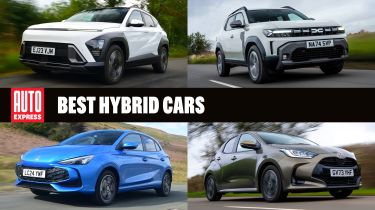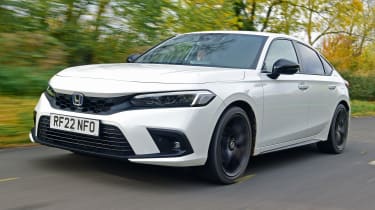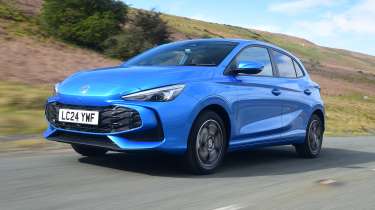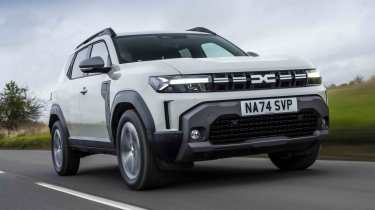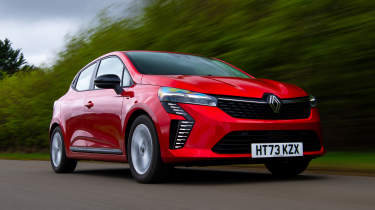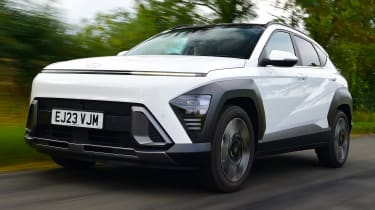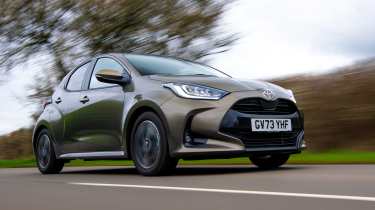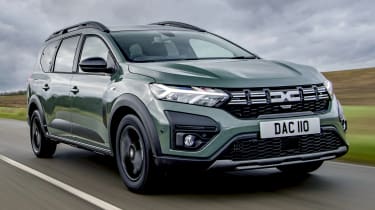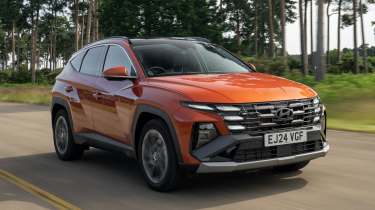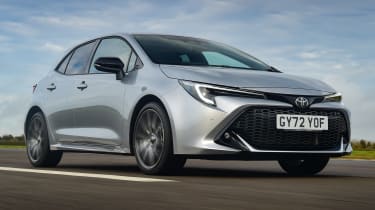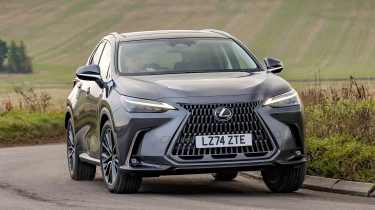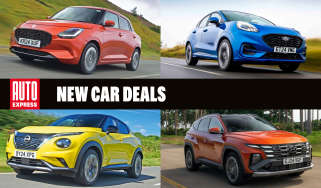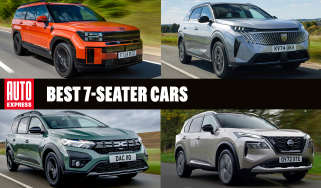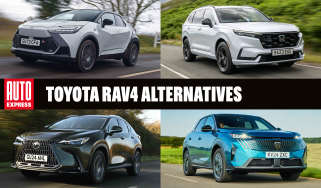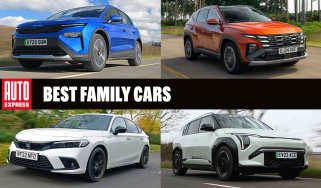Best hybrid cars on sale 2025
With more hybrid cars on the market than ever before, these are the best ones to buy
As car makers continue their efforts to cut their vehicles’ emissions, hybrids are an increasingly popular alternative for buyers who aren’t quite ready to make the switch to an electric car. The best hybrids offer better efficiency than regular petrol or diesel models by combining a traditional combustion engine with one or more electric motors.
While many petrol cars are now fitted with mild-hybrid technology, full hybrids offer the biggest benefits. These cars are capable of running on fully electric power at low speeds, such as in heavy traffic, and the engine will only kick in when it’s absolutely necessary. This can result in some big savings when it comes to emissions and fuel economy.
There’s more good news, too, because there are now more hybrid cars to choose from than ever before. With everything ranging from hatchbacks to family MPVs on offer, there’s a hybrid car for just about everyone. In order to make your search as easy as possible, our experts have thoroughly tested every hybrid car that you can buy in the UK in order to decide the very best.
Read on to see the best hybrid cars that you can buy in 2025. We also answer some frequently asked questions and explain how to choose the best hybrid car for your needs.
1. Honda Civic
- Prices from £35,005
| Pros | Cons |
|
|
A large part of the reason why the Honda Civic is one of our favourite family hatchbacks is down to its brilliant petrol/electric powertrain, so it’s no surprise that it’s also managed to scoop the top spot in our hybrid category, too. Under the bonnet sits a 2.0-litre petrol engine that works alongside a pair of electric motors and a 1.06kWh battery. Not only does that mean there’s a very healthy 181bhp on tap, but around town it’ll also spend the majority of its time driving in full-electric mode.
Inside, the latest Civic combines high-quality materials and a much slicker infotainment system than its predecessor. The notchback bodystyle – with a spacious cabin and 401-litre boot – also offers plenty of space for four people and their luggage.
2. MG3
- Prices from £18,495
- Best value for money
| Pros | Cons |
|
|
The supermini market is dwindling, but the new MG3 looks set to create shockwaves, given that it offers a full-hybrid powertrain capable of returning over 60mpg, a huge amount of on-board tech and a genuinely fun driving experience. The best news, though, is that all of this starts from less than £19,000.
It’s because of this that the MG3 bagged the Affordable Hybrid Car of the Year gong at our 2024 New Car Awards, and we wouldn’t be at all surprised to see it become a big seller for the rejuvenated brand.
3. Dacia Duster
Prices from £24,350
| Pros | Cons |
|
|
The latest Dacia Duster is more desirable than ever, but it still retains its appealingly low starting price. It may be budget-friendly, but the Duster still comes with a respectable amount of kit, especially if you opt for Expression trim. This variant comes with useful features including a 10.1-inch touchscreen with wireless Apple CarPlay and Android Auto. Thanks to its cleverly designed interior, this tough, budget-friendly SUV is more than capable of taking on family car duties, too.
The hybrid-powered Duster is fitted with a 1.6-litre powertrain that’s sourced from parent company Renault and shared with the Dacia Jogger Hybrid, so it’s a tried-and-tested set-up. It shouldn’t be too difficult to achieve an average fuel economy figure of over 50mpg, either.
4. Renault Clio
Prices from £21,695
| Pros | Cons |
|
|
On the outside, the Renault Clio is very much an evolution of its predecessor, especially following its latest facelift. But big changes under the skin have brought it right to the sharp end of the supermini market. The Renault Clio E-Tech features a full-hybrid powertrain that combines a 1.6-litre petrol engine with an electric motor to generate 143bhp.
The E-Tech achieves over 60mpg and sprints from 0-62mph in under 10 seconds, plus the rest of the package is a marked improvement over the old car. The Clio is relatively engaging along twisting roads, and the well judged suspension offers a decent blend of precision and comfort. Cabin quality is particularly strong, too, and the five door-only bodystyle provides enough rear legroom for adults, and a large 391-litre boot.
5. Hyundai Kona
- Prices from £30,685
| Pros | Cons |
|
|
Although the Hyundai Kona Hybrid’s rivals are starting to catch up, our 2023 Car of the Year is still a top buy. Not only does this small SUV offer an impressive level of practicality for its size, but its low running costs and distinctive appearance also help to make it an appealing family car.
It certainly won’t set pulses racing with its 127bhp power output or 12-second 0-62mph time, but the Kona Hybrid more than makes up for its lack of driving excitement with some impressive efficiency figures. We achieved an average of 58.4mpg when we tested the Kona Hybrid against the Honda HR-V in a twin test.
6. Toyota Yaris
- Prices from £23,140
| Pros | Cons |
|
|
The basic template for the Toyota Yaris’s petrol/electric set-up is largely similar to that in the brand’s first production hybrid, the Prius: an Atkinson Cycle petrol engine (in this case a 1.5-litre unit) drives a CVT transmission with assistance from an electric motor and a small battery.
But constant honing of that formula has resulted in a superbly smooth, lively and efficient small car. Officially it’ll hit as much as 70.6mpg, and we achieved a figure very similar to that during testing. Better still, the Yaris is among the more fun cars to drive in its class. While it’s more suited to getting around town, the small supermini can also hold its own on the motorway, making it a sensible all-rounder.
7. Dacia Jogger
- Prices from £23,100
- Best for families
| Pros | Cons |
|
|
There’s no doubt about it, the Dacia Jogger offers incredible value for money. If you want a seven-seat car, it’s much cheaper than almost any other brand-new alternative. You will miss out on some of the luxuries in pricier rivals, but it’s not short on tech under the bonnet.
A 1.6-litre petrol engine works alongside electric motors and a clever multimode gearbox to deliver reasonable performance and return up to 58.9mpg on the WLTP combined cycle. According to Dacia, the Jogger Hybrid can run in pure-electric mode for up to 80 per cent of the time when you’re driving in town. There’s only one downside here; the base pure-petrol Jogger is thousands of pounds cheaper, so unless you do huge miles (or you really need an automatic car), you’re unlikely to recoup that cost with lower fuel bills. But as hybrids go, it’s still a star.
8. Hyundai Tuscon
- Prices from £35,990
| Pros | Cons |
|
|
Its bold styling won’t be to everyone’s tastes, but there’s no denying the Hyundai Tucson’s deep-seated quality as a family SUV. In fact, it’s so good that we’ve named it our Mid-size SUV of the Year for four years on the trot now at our New Car Awards. The Tucson Hybrid utilises a 1.6-litre electrically assisted powertrain with 212bhp, and its efficiency figures are respectable for what is a roomy, tech-packed machine.
Like the Kia Sportage, the Tucson drives with finesse without veering towards sportiness, and its relaxed gait makes it a pleasant companion for long trips. Inside, you’ll find a well built, attractive cabin that offers a generous level of standard kit.
9. Toyota Corolla
- Prices from £30,505
| Pros | Cons |
|
|
Much like the Yaris that also appears on this list, the Toyota Corolla is another model that’s now powered by the brand's tried-and-tested ‘self-charging’ petrol-electric hybrid technology.
The British-built hatch is offered in 1.8 and 2.0-litre guises, both of which automatically shuffle between their two power sources and use the car’s petrol engine to charge the battery. A continuously variable transmission (CVT) takes the place of a traditional automatic gearbox, and this helps to make the most of the drivetrain’s power. Those craving a little more punch will be best catered for by the 2.0-litre model. With 177bhp on tap, 0-62mph takes just 7.9 seconds. Fuel economy and emissions do take a slight hit as a result of the increased power, but this model still offers a great balance of performance and low running costs.
10. Lexus NX
- Prices from £44,445
| Pros | Cons |
|
|
Outgunning BMW in the premium or luxury SUV sector is no mean feat, but Lexus has done exactly that with the NX. The firm has always drawn in customers with its exceptional comfort, superb build quality and impeccable dealer network, and the NX embodies these qualities in an X3-beating package that’s won our Mid-size Premium SUV of the Year award three times in a row.
The NX wraps the Toyota RAV4's powertrain tech in a more opulent, refined SUV, and while the Lexus is objectively the superior car, the more affordable Toyota is better value. Nevertheless, buyers will appreciate the NX's hushed road manners and suave interior, which features the slickest tech we've used in a Lexus. With the optional 14-inch touchscreen set-up, you certainly won't be wanting for more pixels.
The best hybrid cars to buy now
| Rank | Car | Overall rating | MPG, emissions & running costs rating | Engines, performance & drive rating |
| 1 | Honda Civic | 4 | 4.2 | 4 |
| 2 | MG3+ Hybrid | 5 | 4.5 | 4,7 |
| 3 | Dacia Duster Hybrid | 4.5 | 4.7 | 3.8 |
| 4 | Renault Clio E-Tech | 4.5 | 4.5 | 4.5 |
| 5 | Hyundai Kona Hybrid | 5 | 4.5 | 4.5 |
| 6 | Toyota Yaris | 4 | 4.2 | 4 |
| 7 | Dacia Jogger Hybrid | 4.5 | 4 | 3.8 |
| 8 | Hyundai Tucson Hybrid | 4.5 | 4.3 | 3.9 |
| 9 | Toyota Corolla | 4 | 4.1 | 4 |
| 10 | Lexus NX | 4 | 4.5 | 4.3 |
How we choose the best hybrid cars
Our experts thoroughly shake down every hybrid car that you can buy in the UK. In most cases we’ll first try out a brand-new model at its international launch event, and then drive the UK-specific model on British roads when it arrives on our shores. Some of the most popular models also make it onto our long-term test fleet, where a member of our team will live with the car for an extended period.
During our tests we evaluate every characteristic of the car, all of which matter to potential buyers. The areas we test include precise measurements of passenger and cargo space, testing the functionality of tech such as infotainment systems and advanced safety features, and a careful assessment of what the car is like to drive.
With hybrid cars, emissions and efficiency are key, so we use our time with the car to get a clear picture of just how economical the car is in the real world. Once all of our testing is complete, only the best all-round cars make the grade.
How you can choose the best hybrid car
Choosing a hybrid car of any kind rather than a conventionally powered alternative needn’t be the big step that many might fear.
As with the purchase of any new vehicle, it’s sensible to assess your annual mileage, and to consider what you’ll use your car for. If you’re a lower-mileage driver, the running costs of a conventional petrol hybrid could make it a sound alternative to a petrol or diesel car, but if you plan to rack up more miles on the motorway, a regular diesel or even a diesel hybrid might make more financial sense.
Plug-in hybrids (PHEVs) tend to be more expensive than self-charging hybrid models, thanks to their bigger batteries, but you could well recoup the extra if you do most short journeys purely on electric power. If your budget allows – and you can charge the car easily, preferably at home – a PHEV makes a lot of sense as a zero-emissions, zero-fuel commuter, all the while offering the option of covering longer distances with acceptable fuel economy once the engine has kicked in. Just be warned that driving a PHEV for extended periods without charging the battery can lead to very poor efficiency.
Current industry trends mean that SUV buyers are spoilt for choice, but those after other forms of hybrid transport have a little less to choose from. Our list covers most bases, but you won’t find many hybrid city cars or sports cars, for example.
As hybridisation spreads through more car makers’ ranges, it’s likely that choice will continue to expand exponentially. If you’re buying your next family car and want to take a step towards a lower carbon footprint, or just lower running costs, there’s a lot to get excited about.
Frequently Asked Questions
Whether you’re better off with a hybrid or electric car will mostly boil down to your individual requirements and circumstances. In the vast majority of cases, EVs will offer the best efficiency and lower running costs, but those without easy access to charging facilities will probably be better served by a hybrid car.
Now read our list of the best electric cars to buy...

